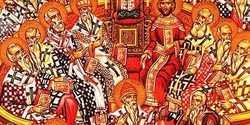
The Benefits of Historical Theology
by Matthew Barrett
I fell in love with historical theology the first time I laid eyes on her. We met in an undergraduate course on The History of Christian Thought. In that class, we read a well-written textbook that provided a narrative introduction to the topic. We also spent time reading primary source texts from some of the most important Christian thinkers in church history. The professor was engaging and winsome, even though he and I frequently didn’t see eye to eye on theological matters. It would be fair to say that I am a professor today in large part because of the influence of that class.
In his new Historical Theology: An Introduction to Christian Doctrine , Southern Seminary professor (and fellow Credo contributor) Gregg Allison includes a very helpful introductory chapter. Allison does what the reader would expect in an opening section by defining historical theology and discussing the layout of his book. But this lover of historical theology was also pleased to find several pages devoted to what Allison calls the “ministerial” role historical theology plays in aiding the church in faith and practice. He lists eight different benefits to understanding historical theology, which I’ve expanded into nine benefits summarized below (with a bit of editorializing from yours truly, in italics):
1. Historical theology helps the church distinguish orthodoxy from heresy–we don’t have to reinvent the theological wheel by being ghetto Modalists, Arians, Pelagians, etc.
2. Historical theology provides sound biblical interpretations and theological formulations–we don’t have to read our Bibles or think about theology from within the vacuum of our own myopic ignorance
3. Historical theology presents stellar examples of faith, love, courage, hope, obedience, and mercy–if Athanasius doesn’t inspire you, then you just ain’t inspirable
4. Historical theology helps to push back against the individualism that is so rampant among contemporary western Christians–we are blessed to be a part of something bigger than ourselves and our churches
4.b (When discussing the above benefit, he includes what I would call benefit “4b”: historical theology helps guard Christians and churches from the penchant for the novel, the yearning for relevancy, and the tendency to follow strong leaders who are biblically and theologically shallow–ahem … you know who you are)
5. Historical theology helps the church to both understand the historical development of Christian beliefs and to express those beliefs in contemporary forms–I don’t really want to sound that different than the Nicene tradition when I explain the triune nature of our God
6. Historical theology helps the church to focus on the essentials, by which Allison means those beliefs that have been emphasized repeatedly throughout church history–historical theological triage, baby
7. Historical theology gives the church hope by providing assurance that Jesus is fulfilling his promise to his people–God was working to bring about his glorious purposes for almost two thousand years in between the death of the last apostle and the day you repented and believed in the Lord Jesus Christ
8. Historical theology reminds the church of today that there is a sense in which we belong to the church of the past–we are in continuity (including theological continuity) with those saints who have gone before us
If you want to see how Allison fleshes each of these benefits out, you will have to read pages 24–29 in the book. I’d encourage you to do that soon. The full bibliographic information is Gregg A. Allison, Historical Theology: An Introduction to Christian Doctrine (Zondervan, 2011).
Nathan Finn (Ph.D., Southeastern Baptist Theological Seminary) is Associate Professor of Historical Theology and Baptist Studies at Southeastern Baptist Theological Seminary and an ordained Southern Baptist minister. Nathan is married to Leah and they are the parents of three children. The Finns are members of the First Baptist Church of Durham, where Nathan teaches theology classes and serves as a deacon. Nathan loves teaching at Southeastern because he enjoys showing students how church history applies to gospel ministry in the 21st century and why our historic Baptist identity is a heritage worth preserving. Nathan has contributed chapters to Calvinism: A Southern Baptist Dialogue (B&H) and Southern Baptist Identity: An Evangelical Denomination Faces the Future (Crossway). He also blogs at OneBaptistPerspective.

